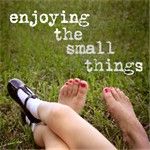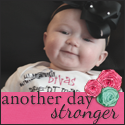Let's put this out here; I have suffered from depression in my life. I am not ashamed to talk about it.
I have dealt with depression twice in my life. Once was soon after I graduated from high school. The second time was soon after Ian was born. We'll focus on that.
Right after Ian was born, I felt weepy. I didn't like being alone, but I felt alone anyway. I thought that most of it would go away after the first few days, but it didn't. No matter what I did, or how happy I was, I felt intrusive and depressing thoughts attacking me. I had this perfect little boy in front of me, whom I loved with all of my heart, but still, I was unhappy.
After dealing with several months of this, I decided that it was time to go back and talk to my doctor about starting a regimen of antidepressants again. Soon, I began to feel better. But they always came along with their unwanted side effects. One of which is something many people describe as "brain zaps". It's basically something where everytime you blink, especially is you blink slowly, you feel this weird "zap" feeling in your head, right behind your eyes and in the top of your head. You wouldn't understand unless you have felt it.
After several months of weaning myself back off of the medication, I was med free again and doing very well for a long time. It's a learning process. You have to find out what works for you. A couple of months later, I conceived Vanessa-Kate.
I was overjoyed to be pregnant again. But realistically I knew that there was a very good chance that I would once again experience postpartum depression. While I am glad that antidepressants were there when I needed them, I hoped to never have to use them again. I didn't like the idea that I had to put something like that into my body just to feel normal again. I started searching for other options.
That's when I came across a post on a message board that I frequent. It was about placenta encapsulation. At first I was extremely put-off. For those of you who don't know, the placenta is an organ that connects the developing fetus to the uterine wall to allow nutrient uptake, waste elimination, and gas exchange via the mother's blood supply. Having your placenta encapsulized entails having it taken after birth, boiled, left in a dehydrator overnight, and then ground up and put into capsules, like vitamins.
Feel free to stop here if you feel grossed out, but I urge you to read on.
Lots of people know about the benefits of the placenta. Animals often eat it after they give birth because it is filled with nutrients that are wonderful for a the mothers recovering body. It also helps the mothers body to produce more milk. Every mothers placenta is different and is perfectly designed for her body. In other cultures, the placenta is eaten by the entire community in special stews and soups. In some cultures it is dried and smoked. Many people bury theirs near a special plant because it is so full of nutrients that it helps plants to flourish.
But I was in no way, shape, or form interested in eating my placenta. Ugh. Turns out, neither are most women in our culture. However, once I considered the idea of having my placenta made into capsules, I started to really warm up to the idea. Considering what is inside of many of the capsules that we take as medication...my own placenta didn't sound so bad. And I was willing to try just about anything to avoid postpartum depression again.
That's when I met Kelsi Meyers at a baby convention. Kelsi works with placenta benefits, which is the leading educator and provider of placenta services. Kelsi has four kids of her own. We chatted, and I decided to give it a try. Three days after Vanessa-Kate's birth Kelsi came to my home and prepared my placenta. Twenty-Four hours later I had 140 capsules. She made me very comfortable with the entire process and way truly a joy to work with.
(Actual pictures of my capsules.)
The short answer is amazing. I am so far from PPD that it's not even funny. I had the "baby blues" and felt kind of weepy for 4 or 5 days after I had her. But since I started taking the capsules, I feel like I'm on top of the world. I honestly feel better than I have in my entire life. I spent $150, less than one months worth of my antidepressants would have cost to have this done...and I wholeheartedly believe it was the best money I have ever spent. You just can't put a price on being able to truly enjoy the first few months of your childs life without the overshadowing of PPD. My energy level is through the roof. I'm actually doing better than just surviving through the sleepless nights, I'm thriving. It's not something that is just for women who fear PPD. It's for all sorts of good reasons; a better energy level, a faster recovery, help with milk production, and fighting off the "baby blues".
Motherhood has made me so much more open to more natural life choices. Before I had Ian, I could care less about what I was putting into my body. But since that time I have found the value of more natural options; organic foods and body products, all natural remedies, chiropractic care (that's another post though), a drug free childbirth and, alas, placenta encapsulation. Holy moly, I think you might even be able to call me "crunchy" these days.
I will most certainly be having this done again next time, and I urge my readers to look farther into it. As I said, I was very put-off at first, but after talking with so many others ladies that have had such a good experience, and learning more about the process, I took a chance.
If you are interested in having your placenta encapsulized in the Columbus/Central Ohio area, please consider Kelsi Meyers.
If you would like to find a provider in your area or simply learn more about the benefits of the placenta, visit placenta benefits.
I'm so very happy that I took a chance on this, you could be too. =)
Update: I exclusively pumped breastmilk for Vanessa-Kate until she was about 4.5 months old. No matter how hard my lactation consultant and I tried, she did not latch well or for long periods of time. So I pumped, and I pumped, and I pumped some more. I really believe the capsules helped me to keep up my milk supply. But at 4.5 months, I decided to try to get Vanessa-Kate to latch. After some hard times, we got there. I breastfeed full time now. But right after I stopped pumping my milk took a bit of a dive. I took a few capsules again (I had stopped taking them at that point) and my milk bounced back up within 24 hours. Amazing.













This is so great. Can I share it?
ReplyDeleteKelsie
I had the same experience... Hx of depression, hx of lots of traditional meds (which I resumed after having my son last wednesday)... Was scared stiff of what I would be like after having him considering our first experience with post partum stuff... Had my placenta encapsulated and have been taking it and wowsers! It works! Was fantastic to discover a cure that is so basic and a little primal :)
ReplyDeleteKelsey, I never got your comment until now. Of course you can!
ReplyDelete